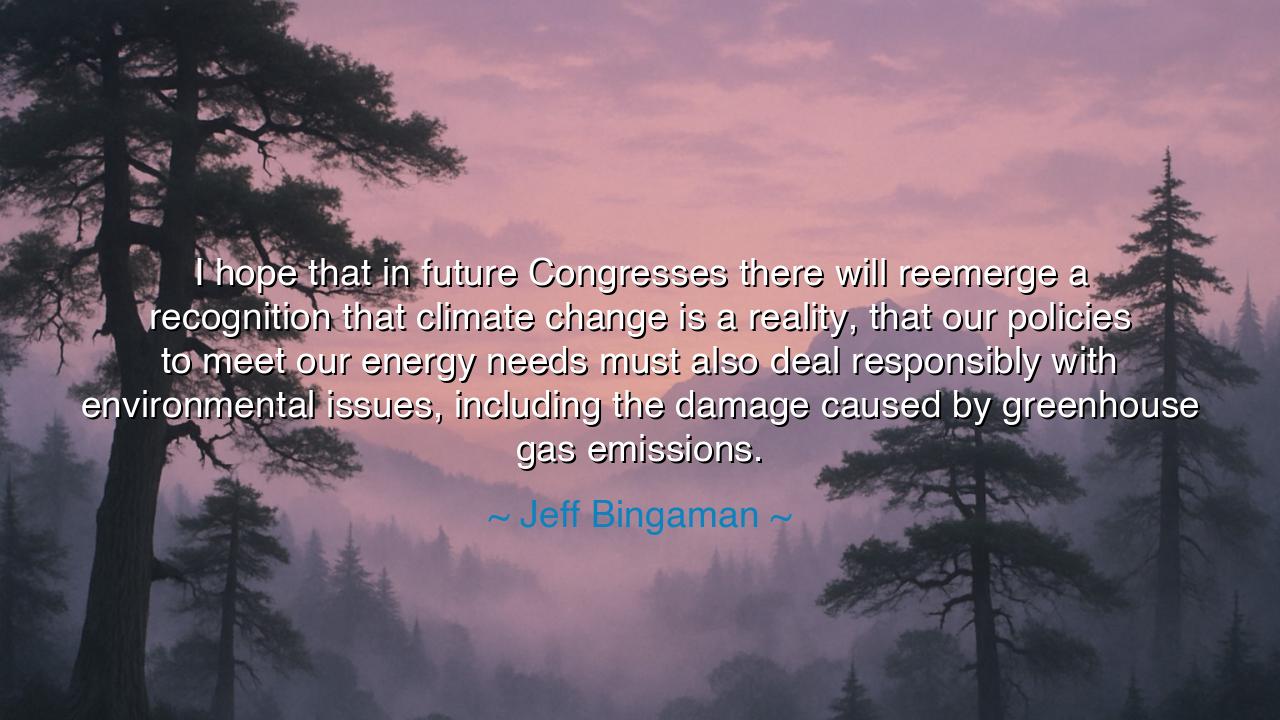
I hope that in future Congresses there will reemerge a
I hope that in future Congresses there will reemerge a recognition that climate change is a reality, that our policies to meet our energy needs must also deal responsibly with environmental issues, including the damage caused by greenhouse gas emissions.






Hear the steady and solemn words of Jeff Bingaman, once a senator of the United States, who declared: “I hope that in future Congresses there will reemerge a recognition that climate change is a reality, that our policies to meet our energy needs must also deal responsibly with environmental issues, including the damage caused by greenhouse gas emissions.” These words are not the boast of ambition, but the prayer of a statesman who looked upon his nation and saw both its strength and its peril. They are at once a lament for the blindness of the present and a hope for the wisdom of the future.
The meaning of this saying lies in the union of reality and responsibility. Bingaman warns that climate change is no illusion, no debate of scholars alone, but a truth inscribed in rising seas, burning forests, and storm-tossed cities. Yet he also speaks of policy, the work of governance, where choices about energy—whether coal, oil, gas, or renewables—shape the fate of both economy and environment. His cry is clear: to ignore the damage caused by greenhouse gases while pursuing energy is to mortgage the earth’s future for short-term gain. Only by facing reality with responsibility can a nation endure.
The origin of his words rests in the battles of modern governance. In Congress, the halls of debate often echo with conflict between profit and preservation, between denial and acknowledgment. Many leaders, bound by the chains of industry, chose to doubt or delay, even as evidence mounted. Bingaman, seeing this, spoke not as a prophet of despair but as a man who believed in the possibility of reemergence—that truth might rise again in the councils of power, and that leaders might rediscover their duty to posterity. His hope was not blind, but anchored in the long tradition of reform that has, at times, risen even in the most resistant of chambers.
History gives us echoes of this struggle. When London in the mid-twentieth century was suffocated by the deadly smog of coal fires, many denied or delayed action. Yet at last, after tragedy, came the Clean Air Act of 1956, a turning point that saved lives for generations. Likewise, in America, rivers once choked with chemicals caught fire, until the Clean Water Act and the creation of the EPA brought renewal. These victories teach us that governments may falter, but truth can indeed reemerge, and leaders can act with courage once the will of the people is stirred. Bingaman’s words stand in this lineage, calling for such renewal in the age of climate change.
Yet there is also a deeper current: the recognition that energy is both blessing and curse. From fire in ancient caves to the engines of modern industry, humanity has always sought power to shape its destiny. But every source of power bears a cost, whether smoke, soot, or carbon. Bingaman reminds us that the pursuit of energy needs cannot be divorced from the care of the earth. To split the two is folly, for energy drawn from destruction is no true progress. Only when power is pursued with wisdom, with reverence for the earth, does it become a tool of civilization rather than a weapon against it.
The lesson for us is urgent: demand that leaders, in Congress or elsewhere, see reality as it is, not as convenience paints it. Do not accept policies that chase energy while ignoring the environment. Support those who balance innovation with preservation, who see that economic prosperity and ecological responsibility must walk hand in hand. Remember that denial, however profitable, is but a delay before disaster. Recognition must not only reemerge—it must root itself so deeply that no passing interest can uproot it.
Therefore, take practical action. In your own life, choose energy with care: conserve where you can, support renewables, speak against waste. In your community, demand accountability from those who profit by poisoning the skies. Teach the young that the earth is not an infinite storehouse, but a living home whose balance sustains all life. And above all, keep hope alive, as Bingaman did, that even the most stubborn of councils can awaken to truth when the people demand it.
So remember his words: “I hope that in future Congresses there will reemerge a recognition that climate change is a reality.” Let them be both warning and encouragement. For though leaders may falter and delay, reality cannot be silenced, and truth will press itself upon the world. The question is not whether the earth will change, but whether humanity will change in time. And the answer lies in the courage to unite policy with responsibility, so that our children inherit not ruin, but renewal.






AAdministratorAdministrator
Welcome, honored guests. Please leave a comment, we will respond soon